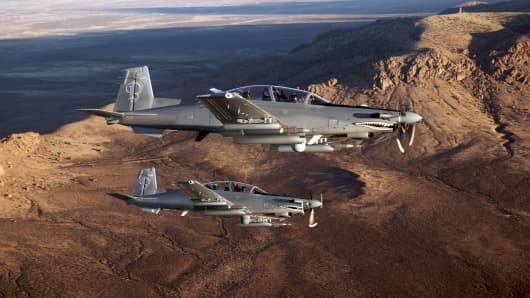The U.S. government was wrong to purchase foreign aircraft for its operations in Afghanistan, the CEO of American aircraft manufacturer, Beechcraft, told CNBC this week.
The U.S. Air Force bought 20 light aircraft from Embraer earlier this year, with the Department of Defense opting to buy from the Brazilian company instead of Beechcraft. The contract, worth roughly $428 million, is Embraer's first deal with the U.S. air force.
In an interview with CNBC, Beechcraft's chief executive, Bill Boisture, questioned the government's wisdom in relying on a foreign manufacturer for its aircraft.
"The exception we take with the policy decision is that the Brazilian government can choose whether to support this airplane, once it is fielded with an ally country. We [the U.S.] don't have any control over that policy decision," said Boisture, speaking from the sidelines of the Paris Air Show.
"It is an interesting political problem, because Brazil has not aligned itself on many of the issues that have been important to the U.S. over the last several years."
(Read More: A New Balance of Power Between Military and Commercial)
As an example of the benefits of dealing with domestic aerospace companies, Boisture highlighted Grumman's sale of its F-14 Tomcat to the Imperial Iranian Air Force.
"There was a point at which our interests diverged significantly and differently from Iran and we [the U.S.] had control over the support for the weapons system — the parts, the technical information — and we simply stopped supporting it," he said.
Beechcraft has past form in questioning various aspects of the government's contract with Embraer.
Last Thursday, for instance, the Government Accountability Office dismissed a complaint from Beechcraft that the air force had overpaid for the Embraer planes.
Beechcraft has also warned that the contract will take jobs away from the U.S. However, Embraer has said it will hire around 1,200 workers to build the 20 A-29 Super Tucano aircrafts, and opened a production facility in Florida this year.
(Read More: After the Global Recession, Who's Still Spending on Military Aircraft?)
For Beechcraft, the Embraer contract award is part of an increasingly competitive aerospace market, with established suppliers facing strong competition from emerging market newcomers, particularly China and Russia. In addition, anemic global growth resulted in a fall in military spending in 2012, according to the Stockholm International Peace Research Institute.
"Without question it is more competitive… We are experiencing competition to which we have to respond," said Boisture.
According to the Stockholm Institute, China became the fifth largest exporter of major conventional arms this year. This is the first time it had reached the top five since the end of the Cold War.
(Read More: Military Aircraft: Boeing's Most Famous Models)
Meanwhile, Russia demonstrated its aerospace capabilities at this year's Paris Air Show, where United Aircraft showcased the new defense systems and missile capability of its Sukhoi Su-35.
Boisture said Beechcraft, a company with an historic brand name, could easily compete with newcomers to the market. However, he added that it was still hard to understand Embraer's contract award.
"It's a hard decision to understand, and I suspect it would be a hard decision to explain," he said, adding, "The air force has told us they intend to limit the purchase to 20 airplanes that have been purchased, so that makes sense."


